In the academic year 2024–25, the Gurmani Centre for Languages and Literature continued its commitment to nurturing thoughtful engagement with Pakistan’s rich linguistic and literary traditions. Through a wide range of events, publications, and language courses, the Centre served as a vibrant space where ideas, stories, and voices from across the region could meet, converse, and push back against inherited colonial constraints on language, identity, and expression. From celebrating classical texts and regional languages to exploring the entanglements of history, politics, and aesthetics within literary traditions, our work this year reflected a belief that knowledge is not imported—it is rooted, evolving, and intimately tied to the languages we speak and the worlds we inhabit.
Fall Term Recap (Sept-Dec 2024)
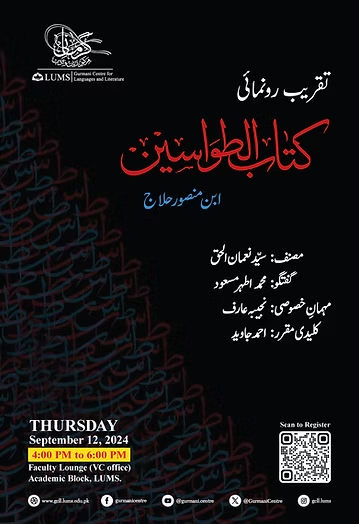
Kitāb al-Ṭawāsīn by Syed Nomanul Haq
This session held in September 2024 marked the launch of Syed Nomanul Haq’s latest work, Kitāb al-Ṭawāsīn, and featured prominent speakers including Ahmad Javed, Dr. Najeeba Arif, and Athar Masood. Hosted by Dr. Ali Usman Qasmi, the event opened with Haq’s reflections on the complex figure of Mansur al-Hallaj, emphasising the interplay between his historical and metaphysical dimensions. Athar Masood highlighted the book’s intellectual rigour and literary elegance. Dr. Najeeba Arif described the work as a milestone in contemporary Islamic thought, particularly for its exploration of Haqiqat-e-Muhammadi (PBUH), and emphasised its creative relevance within the tradition of Islamic cultural expression. Concluding the session, Ahmad Javed lauded the book as a valuable contribution to modern Sufi studies and offered a profound reading of one of Hallaj’s poems featured in the text, noting that it revives Hallaj’s revolutionary spirit for a new generation of readers.
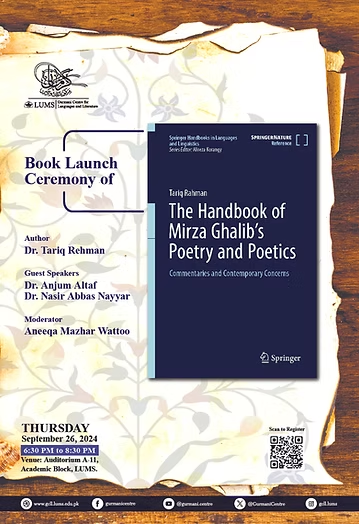
The Handbook of Mirza Ghalib’s Poetry and Poetics by Dr. Tariq Rehman
The launch event held in September 2024, was moderated by Aneeqa Mazhar Wattoo and featured an engaging discussion with Dr. Tariq Rehman, Dr. Anjum Altaf, and Dr. Nasir Abbas Nayyar. Dr. Rehman opened the event by outlining the motivations behind the book, addressing the challenges posed by modern education’s disconnect from classical literature and stressing the book’s aim to make Ghalib accessible to readers unfamiliar with Urdu. Dr. Anjum Altaf reflected on Ghalib’s timeless relevance, praising the clarity of the book’s translations and its ability to engage contemporary audiences with the complexities of poetic expression. Dr. Nasir Abbas Nayyar addressed the historical reception of Urdu ghazal, critiquing colonial misreadings and advocating for a culturally rooted understanding of Ghalib’s poetics. He lauded the book as a landmark contribution to Ghalib studies, particularly for its decolonial framing and depth of literary commentary.
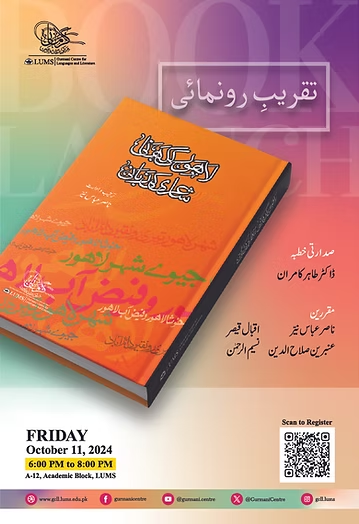
Lāhore kī Kahānī, Shāiyrī kī Zubānī — Book Launch
The launch of the third publication of the Centre’s Publication Cell, was held in October 2024 and featured a distinguished panel including Dr. Ambreen Salahuddin, Iqbal Qaiser, Dr. Nasir Abbas Nayyar, and Dr. Tahir Kamran. The session explored the representation of Lahore as a space and place in literature, with Dr. Nayyar opening the discussion by examining how Lahore is produced and experienced through literary and artistic expression. Dr. Ambreen Salahuddin reflected on the book’s preface as a ‘Sheharnāmā’, underscoring the need to consider gender dynamics in urban literary discourse, especially the differing spatial agency of female poets. Iqbal Qaiser praised the book for its comprehensive coverage and potential to spark deeper research into Lahore’s cultural history. Dr. Tahir Kamran concluded with a theoretical framing of space and time, discussing colonial and migratory impacts on literary memory and place attachment. The event ended with a vibrant Q&A session.
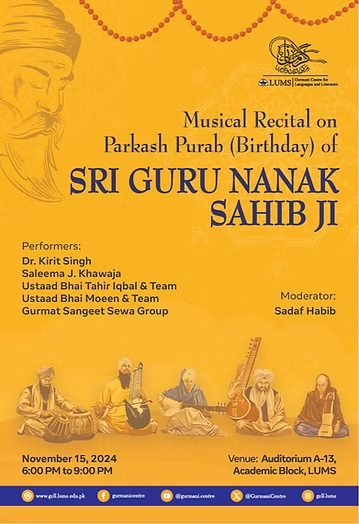
Honouring Guru Nanak: Celebrating the Rababi Tradition through Film Screening and Shabad Kirtan Performance
The session held in November 2024 was a two-day event, celebrating the musical legacy of the Rababi tradition and the birth anniversary of Baba Guru Nanak. The first day featured a screening of the documentary Mardana’s Children: Rababis of Lahore, followed by a panel discussion with Dr. Kirit Singh, Saleema J. Khwaja, and Ustad Bhai Moeen, moderated by Dr. Khola Iftikhar Cheema. The conversation highlighted the history of Muslim Rababis—devotees who served Sikh Gurus through music—addressing their marginalisation post-Partition and reflecting on their cultural and spiritual contributions. A Shabad Kirtan performance titled Musical Recital on Prakash Purab of Sri Guru Nanak Sahib Ji brought together Ustad Bhai Moeen, Ustad Bhai Tahir Iqbal, Saleema Khwaja, Dr. Singh, and the Gurmat Sangeet Sewa Group in a moving tribute. The performances illuminated the living continuity of the Rababi tradition and its role in sustaining the plural ethos of the subcontinent.
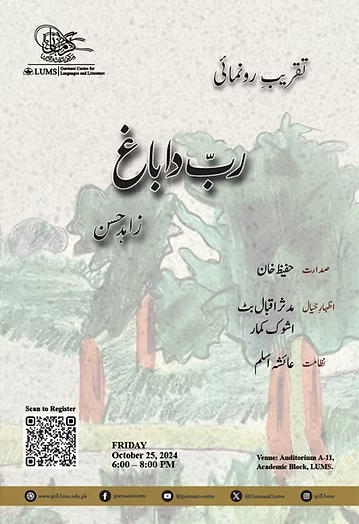
Rabb dā Bāgh by Zahid Hassan — Book Launch
The event held in October 2024 featured Ashok Kumar (Punjab University), Mudassir Iqbal Butt (Chairman, Punjab Media Group), and Zahid Hassan. Ashok Kumar opened the discussion by emphasising the poet’s role as a chronicler of pain and collective memory, praising Rabb dā Bāgh a significant addition to Punjabi fiction, especially at a time when literary output in the language is declining. Zahid Hassan read selections from his work and reflected on the inspiration he drew from Lahore’s landscape and his personal experiences. Mudassir Iqbal Butt, delivering the presidential remarks, spoke of Hassan’s literary journey and described the book as a vital fusion of classical sensibilities and modern themes. Concluding the session, Dr. Ali Usman Qasmi reaffirmed the Centre’s commitment to supporting literary expression in Pakistan’s regional languages, particularly Punjabi fiction.
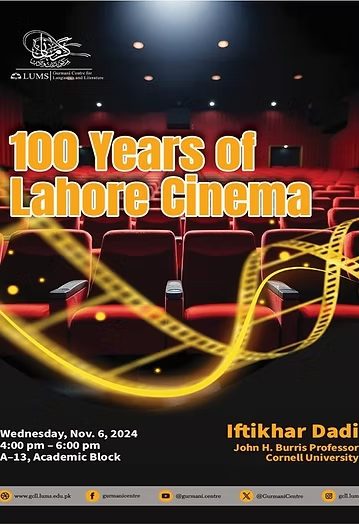
100 Years of Lahore Cinema: A Session with Iftikhar Dadi
Held in November 2024, the talk explored the role of Lahore’s commercial cinema in shaping shared experiences of modernity and identity, bridging social and cultural divides across South Asia. Dadi introduced the concept of the ‘Lahore Effect’, coined by Rajadhyaksha, to highlight Lahore’s cinematic legacy, which draws from Hindu mythology, Islamic legends, Urdu literature, Sufi thought, and global cinema. Analysing the recurring Anarkali theme in both Lahore and Bombay cinema, Dadi discussed films such as Mughal-e-Azam and Ghoonghat, illustrating the city’s lyrical and hybrid cinematic form. A key concern raised was the absence of a national film archive in Pakistan, which limits access to a vast multilingual cinematic heritage, unlike India and Bangladesh.
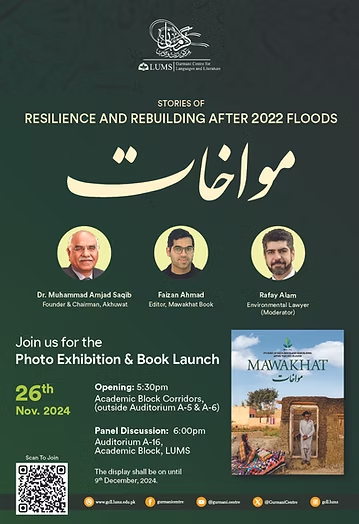
Book Launch and Photo Exhibition of Mawākhāt: Stories of Resilience and Solidarity After the 2022 Floods
The event held in November 2024 showcased a compelling collection chronicling resilience and resistance in the aftermath of Pakistan’s devastating 2022 floods that displaced nearly 33 million people. The book presents over 100 powerful stories and portraits showcasing lives transformed through Akhuwat Foundation’s flood relief efforts, which rebuilt more than 6,000 homes across Sindh, Balochistan, Khyber Pakhtunkhwa, and Punjab. The event featured Dr. Amjad Saqib, founder of Akhuwat; environmental lawyer Ahmad Rafay Alam; and editor Faizan Ahmad. Alam highlighted the human-driven causes of climate change, emphasising overconsumption and the exploitative economic systems of the Global North, and stressed that recovery requires reimagining life itself beyond mere reconstruction. Dr. Saqib discussed Akhuwat’s unique interest-free microfinance model, which empowered communities towards full recovery and reflected on Mawākhāt as a philosophy of mutual support bridging social divides. Faizan Ahmad shared his experience documenting the flood-affected communities with sensitivity and dignity, capturing their enduring spirit. In closing, Alam underscored the inequities in environmental accountability, noting that those most responsible often evade blame while vulnerable populations bear the consequences.
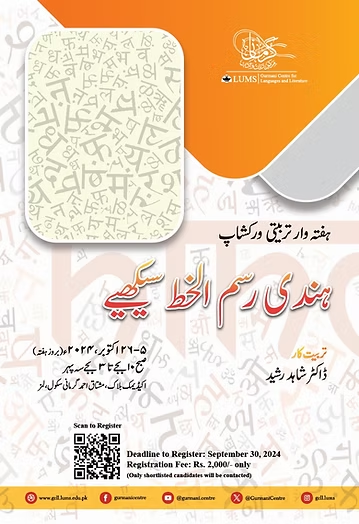
Hindī Rāsm ul Khat Sīkhēn — Language Workshop
This four-session weekly workshop, held in October 2024 was led by Dr. Shahid Rasheed, Assistant Professor at Forman Christian College and an experienced Hindī language trainer. The workshop brought together scholars and students eager to develop a foundational understanding of the Hindī script and its cultural significance. In the first session, Dr. Rasheed introduced the script alongside a broader discussion on South Asian mythology, particularly the Māhābhārata and Rāmāyan, illustrating their influence on language and identity. Through interactive exercises, participants began practicing basic letter forms and improved their writing skills. Subsequent sessions delved into Hindī grammar, sentence construction, and reading selected poetry from the Hindī Qāid’ah, enriching participants’ grammatical understanding and appreciation of poetic forms. The final sessions focused on reading fluency, group discussions of Hindī texts, and revision of grammar through collaborative exercises. The workshop concluded with Dr. Rasheed’s evocative reading of the poem Hai Kathā Sagrām kī, Vishu kē Kalyān kī. Dr. Ali Usman Qasmi thanked Dr. Rasheed and the participants for their dedication, distributed certificates of completion, and announced plans for an upcoming Sanskrit language workshop, encouraging continued engagement with South Asian linguistic traditions.
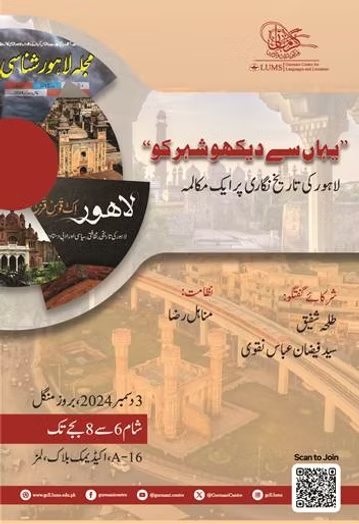
Yahāṅ sē Dēkho Shehr ko: Lahore kī Tārīkh Nīgārī per Mukālma—A Dialogue on Lahore’s Historiography
This compelling session in December 2024 focused on the historiography of Lahore. The discussion featured two young self-taught historians, Talha Shafeeq and Syed Faizan Abbas Naqvi, moderated by LUMS visiting faculty Manahil Raza. The session began with Shafeeq’s reflections on his book Lāhor: Aik Qos-e-Qaẕah, drawing inspiration from South Africa’s ‘Rainbow Culture’ to describe Lahore’s multicultural and multi-religious identity. Both speakers shared their deep intellectual and personal engagements with Lahore’s layered history, highlighting Shafeeq’s research on lesser-known sites—architecture, tombs, mosques, and temples—and Naqvi’s advocacy through Lahore Shanasi to protect the city’s endangered heritage amid urban pressures. They emphasised adopting alternative, community-centred methodologies for studying local histories, integrating themes like environmentalism, gender inclusivity, and resource inequality to democratise historiography. The session concluded with a lively Q&A session, engaging the audience in critical reflections on preserving and narrating Lahore’s rich, complex past.
Spring Term Recap (January-May 2025)
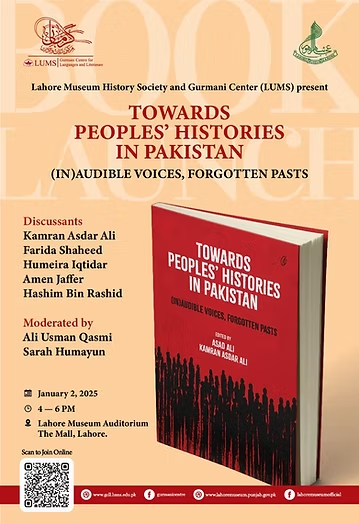
Graduate Student Training Workshop on South Asian Languages and Literature
This workshop, held in January 2025, welcomed emerging scholars from across Pakistan. Designed for graduate students and early-career academics, the workshop focused on building critical engagement with South Asian languages, literatures, and their historical contexts through the lens of vernacular humanities. Led by Professors Maryam Wasif Khan and Ali Raza, the sessions combined close readings, theoretical reflection, and methodological inquiry into the role of humanism in postcolonial thought. Participants engaged in intensive discussions on disciplinary formations, colonial legacies, and the ethical demands of knowledge production in the Global South.
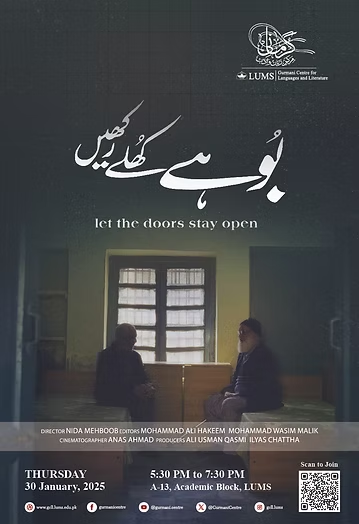
Buhay Khulay Rakhi: Remembering the Lost Children of Partition
The Centre screened Buhay Khulay Rakhi (Keep the Doors Open), a documentary directed by Nida Mehboob, in January 2025. It spotlighted the untold stories of children who are separated, orphaned, or adopted across religious lines during the 1947 Partition of Punjab. Produced by historians Dr. Ali Usman Qasmi, Dr. Ilyas Ahmad Chattha, and Dr. Ali Raza, the film uses personal testimonies and archival footage to reveal the lasting trauma of Partition, focusing on individuals like Qari Farooq and Fazal Ahmad who were adopted by Sikh and Dalit families before being repatriated to Pakistan. The post-screening panel, moderated by Dr. Ali Razam featured Mehboob and historian Khayyam Chohan, whose Desi Infotainer YouTube channel has become an important platform for reconnecting families and sharing personal Partition narratives beyond official histories. The discussion explored how religion was wielded as a divisive tool leading to violence and displacement, and how digital platforms now provide a vital space for collective memory, cross-border dialogue, and healing.
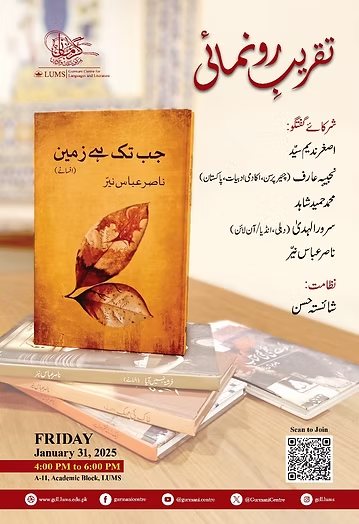
Launch Event of Nasir Abbas Nayyar’s Fifth Short Story Collection Jab Tak Hai Zameen
In January 2025, the Centre hosted the launch of the fifth short story collection by acclaimed writer and critic Nasir Abbas Nayyar. Dr. Asghar Nadeem Syed, Dr. Najiba Arif, Muhammad Hameed Shahid, and Prof. Sarwar Al-Huda (joining online from Delhi) discussed its intellectual and artistic merits. Moderated by Shaista Hassan, the session featured insightful reflections on Nayyar’s unique style that blends cultural depth, intellectual rigour, and imaginative language. Prof. Sarwar Al-Huda praised the synthesis between Nayyar’s critical and creative voice, noting how his stories transcend language to express cultural and humanistic themes. Muhammad Hameed Shahid lauded Nayyar’s balanced approach of combining storytelling with wisdom and reflection, while Dr. Syed discussed the collection’s contemporary relevance, particularly highlighting the story ‘Apne Mazi Ke Khuda’ for its ecological themes. Dr. Arif commended the stories for provoking thoughtful unease rather than mere emotional reaction.
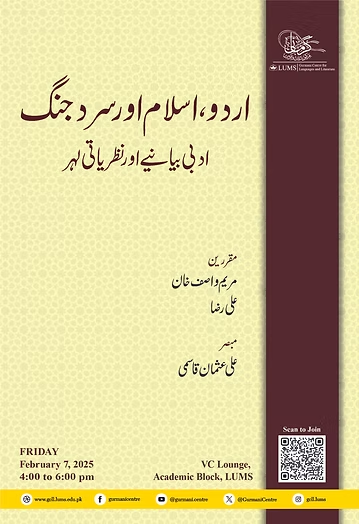
Discussion on ‘Urdu, Islam, and the Cold War: Literary Narratives and Ideological Currents’
The Centre hosted this compelling discussion in February 2025, which featured Dr. Ali Raza, Dr. Maryam Wasif Khan, and Dr. Ali Usman Qasmi. The panel explored the ideological and literary evolution from colonial to postcolonial Pakistan, with a focus on the Cold War’s profound impact on literary narratives and cultural production. Dr. Wasif Khan traced Urdu literature’s engagement with questions of Muslim identity, shaped by Orientalist legacies and reformist fiction that prioritises piety, citizenship, and gender roles, within an Islamic nationalist framework. Dr. Raza contexualised Urdu’s development within global Cold War politics, examining how US-sponsored initiatives like the Congress for Cultural Freedom and Soviet programmes influenced literary production in Pakistan. He explored social realism, jazz’s rise, and ideological contestations within academic circles, particularly the CCF Pakistan Committee’s efforts to shape discourse.
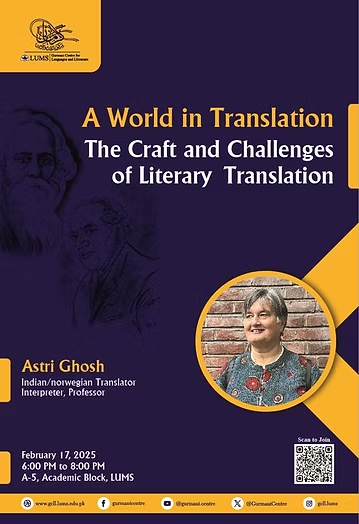
A World in Translation with Astri Gosh
This captivating session with acclaimed translator Astri Gosh was held in February 17, 2025. Gosh shared her perspective on the delicate balance translators must strike between fidelity to the source text and fluency in the target language. Emphasising translation as a bold, experimental act rather than word-for-word conversion, she discussed the challenges of preserving cultural nuance, emotional tone, and narrative atmosphere. Gosh discussed the challenges posed by varying publishing cultures and the tension between faithfulness to the source and accessibility for new audiences.
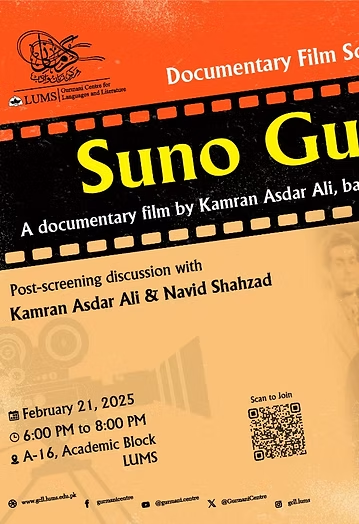
Screening of Suno Gup Shup
The screening of Suno Gup Shup, a documentary by Kamran Asdar Ali that revisits the iconic 1970s Pakistan Television show Such Gup, was held in February 2025. The documentary offered a nostalgic exploration of the show’s pioneering role in political and social satire, highlighting its sharp wit, bold critique of bureaucracy, education, and politics, and its influence on later satirical programmes. Featuring reflections from the Such Gup cast, the film revealed the show’s clever handling of sensitive topics such as the Bangladesh liberation and prisoners of war, along with a tribute to the late Nayyara Noor, whose songs enriched the series. The post-screening discussion included historian Ali Usman Qasmi and filmmaker Kamran Asdar Ali, who spoke about the making of the documentary, archival challenges, and the unique Lahori humour—marked by irony and subtlety—that defined Such Gup.
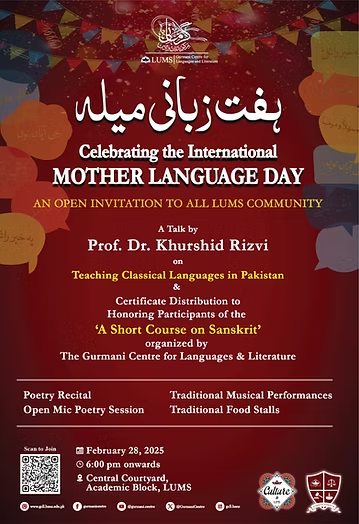
Haft Zubani Mela
In collaboration with the LUMS Cultural Society and Student Council, the Centre hosted the Haft Zubani Mela, a vibrant celebration of Pakistan’s linguistic and cultural diversity in February 2025. The event brought together scholars, poets, musicians, and students for an evening of dialogue, poetry, and music dedicated to honouring the country’s rich multilingual heritage. Dr. Ali Usman Qasmi opened the evening by highlighting the colonial legacy of language politics and advocating for the revival of local and classical languages. Special guests Ashok Kumar and Dr. Shahid Rasheed offered reflections on the role of language in shaping collective identities. A key highlight of the evening was an illuminating talk by Dr. Khurshid Rizvi on Teaching Classical Languages in Pakistan, followed by a certificate distribution ceremony for participants of the Short Course on Sanskrit. The literary segment featured a multilingual Mushaira presided over by Dr. Rizvi, with performances by Hammad Niazi, Fariha Naqvi, Raz Ehtesham, and student poets. The event concluded with powerful musical renditions from various regions of Pakistan, celebrating indigenous languages and traditions.
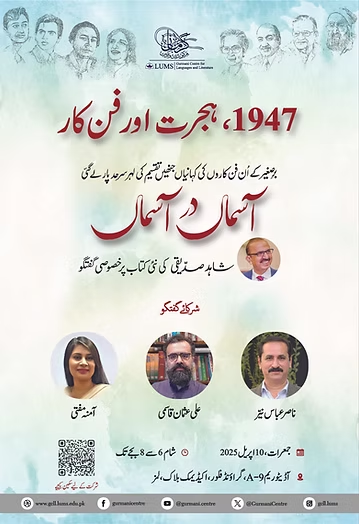
Literary Session on Aasmān Dar Aasmān with Dr. Shahid Siddiqui
The literary session on the latest book by renowned scholar and writer Dr. Shahid Siddiqui was held in April 2025. Centred on the theme 1947, Migration, and the Artist, the event featured distinguished historian Dr. Ali Usman Qasmi and acclaimed fiction writer Amna Mufti, who explored the emotional, psychological, and aesthetic dimensions of migration. Dr. Qasmi argued that migration is not merely a political rupture but a civilizational trauma that reshapes the artist’s interior world. Amna Mufti praised the simplicity and emotional depth of Dr. Siddiqui’s prose, noting its ability to connect with readers and foster reflection on the lasting effects of Partition. The book’s exploration of the lives of artists such as Mehdi Hassan, Noor Jehan, and Raees Khan offered a poignant inquiry into how displacement informs art, memory, and identity.
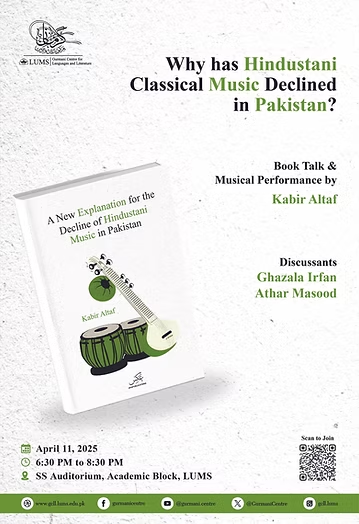
Book Talk and Performance: A New Explanation for the Decline of Hindustani Music in Pakistan
This thought-provoking session held in April 2025 blended a critical discussion with a moving live performance. Originally written as a dissertation in ethnomusicology at SOAS, Altaf’s work reframes the decline of Hindustani classical music not as a mere consequence of religious conservatism or lost patronage, but as a result of broader sociological processes such as Partition, modernisation, and the transformation of gharana structures. Historian Dr. Ghazala Irfan, drawing on APMC archives and her fieldwork, questioned the narrative of decline by pointing to the enduring presence of classical music in urban spaces. Altaf responded by distinguishing between public visibility and the structural erosion of the khayal tradition. Musician and critic Athar Masood praised the book’s synthesis of scholarly rigour and musical insight, while critiquing commercial platforms like Coke Studio for sacrificing classical integrity in the pursuit of mass appeal. The evening culminated in a soul-stirring performance by Altaf, who guided the audience through khayal, dardā, and ghazal, turning the recital into a musical conversation.
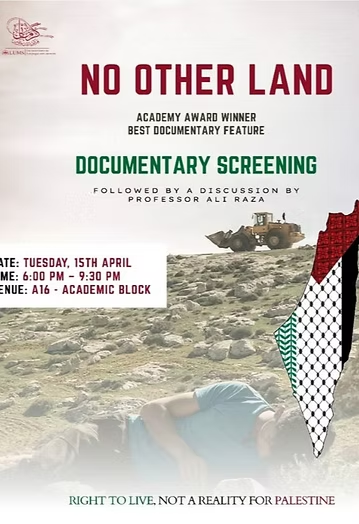
Documentary Screening: No Other Land
No Other Land, a powerful and award-winning documentary chronicling the forced displacement of Palestinians in Masafer Yatta, located in the occupied West Bank, was shown to the LUMS audience at a screening in April 2025. Co-directed by Palestinian and Israeli filmmakers Basel Adra, Hamdan Ballal, Yuval Abraham, and Rachel Szor, the film stands as a rare collaboration that defies political boundaries while highlighting the deeply unequal realities of occupation. Through raw footage spanning from 2019 to 2023, the film captures the demolition of homes, the trauma of dispossession, and the daily resistance of Palestinians struggling to preserve their lives and history. Following the screening, historian Dr. Ali Raza reflected on the film’s moral and political urgency, stressing the ethical importance of storytelling to confront systems of oppression.
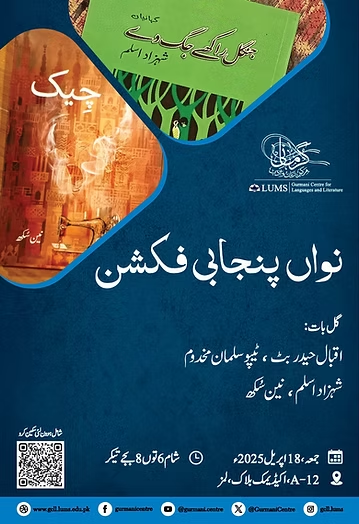
Literary Discussion: Modern Punjabi Fiction
The engaging literary session on the evolution of modern Punjabi fiction, spotlighting Chīk, a novel by Nain Sukh, and Jangal Rakhay Jag dey, a short story collection by Shahzad Aslam was held in April 2025. The discussion opened with Iqbal Haider Butt’s critical reflection on Chīk, discussing the novel’s embrace of linguistic hybridity and its resistance to treating Punjabi as a marginal language. He praised Nain Sukh’s narrative for its anthropological depth and its critique of the socio-political formation of Punjab’s elite. The second half of the event spotlighted Shahzad Aslam, who discussed the intellectual trajectory of his fiction, drawing links from classical poetics to modernist influences such as Virginia Woolf. His insights into narrative techniques such as stream of consciousness were complemented by Tipu Sultan Makhdoom’s critique, which indicated the importance of perspective and introspection in literary storytelling.
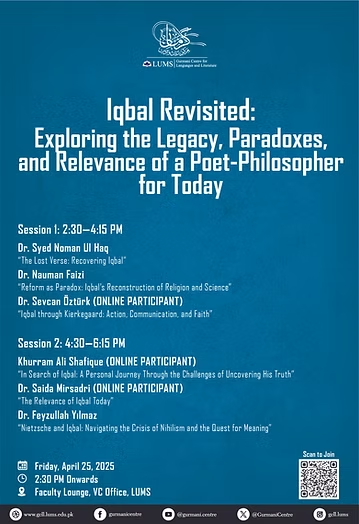
Iqbal Revisited: A Multidimensional Symposium
Held in April 2025, Iqbal Revisited: Exploring the Legacy, Paradoxes, and Relevance of a Poet-Philosopher for Today, was a multidimensional symposium re-examining the work of Allama Iqbal in light of today’s spiritual, philosophical, and social crises. The first session featured Dr. Syed Nomanul Haq’s call to rediscover the aesthetic and metaphysical depth of Iqbal’s verse; Dr. Nauman Faizi’s framing of reform as a shared vulnerability; and Dr. Sevcan Öztürk’s comparative reading of Iqbal and Kierkegaard on faith and selfhood. The second session opened with Khurram Ali Shafique’s personal and interpretive journey through Iqbal’s writings, proposing a new framework of ‘Iqbal Sciences’. Dr. Saida Mirsadri reflected on Iqbal’s call for dignity and moral agency amid modern disorientation, while Dr. Feyzullah Yılmaz offered a provocative reading of Iqbal’s philosophical journey through nihilism, engaging with Nietzsche and Islamic metaphysics.
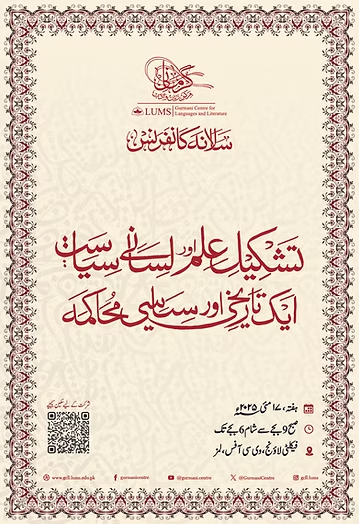
Conference Report: The Formation of Knowledge and Language Politics—A Historical and Political Inquiry
The landmark conference titled “تشکیل علم اور لسانی سیاست: ایک تاریخی اور سیاسی محاکمہ” (The Formation of Knowledge and Language Politics: A Historical and Political Inquiry), held in May 2025 brought together scholars from across Pakistan to critically examine the intersections of colonial knowledge production, language politics, and literary canon formation in South Asia. Opening remarks by Dr. Ali Usman Qasmi and Dr. Ali Khan framed the event within ongoing debates on epistemic decolonisation and the challenges of preserving linguistic diversity. The conference featured three sessions: the first explored the impact of colonial missionary institutions on literary standards; the second delved into print culture’s role in shaping religious and nationalist identities; and the third addressed post-1947 linguistic politics and regional language marginalisation in Pakistan. A final panel, including Zahra Sabri, Mufti Abdul Aziz, and Dr. Nasir Abbas Nayyar, discussed the obstacles and potentials of Urdu as a scholarly research language, sparking a lively Q&A on sustaining linguistic plurality in academia.

